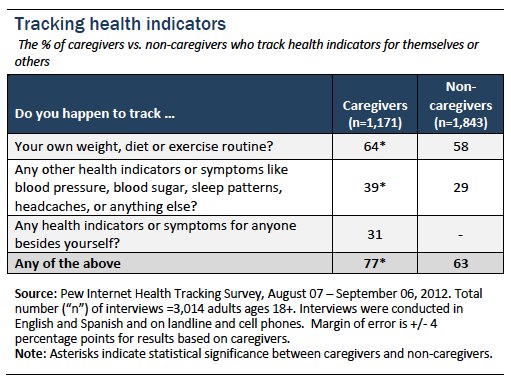Seven in ten caregivers track a health indicator for themselves
Fully 72% of caregivers track their own weight, diet, exercise routine, blood pressure, blood sugar, sleep patterns, headaches, or some other health indicator. By comparison, 63% of non-caregivers track some aspect of their health. When controlling for age, income, education, ethnicity, and good overall health, being a caregiver increases the probability that someone will track a health indicator.
Education and age also play a role. Being college-educated increases someone’s likelihood to track their weight, diet, or exercise routine. College-educated adults, however, are less likely to track other health indicators like blood pressure, blood sugar, sleep patterns, or headaches, possibly because they are less likely to be living with a chronic disease or other health condition. Being younger (between the ages of 18 and 39) is also independently associated with a lower likelihood to track other health indicators.
One in three caregivers track health indicators or symptoms for their loved one
Thirty-one percent of caregivers keep track of their loved one’s weight, diet, exercise routine, or other health indicators or symptoms. Female caregivers are more likely than their male counterparts to do so: 35% vs. 26%.

Tracking on paper, spreadsheet, mobile device—or just “in their heads”
When asked to think about how they track the health indicator they pay the most attention to, either for themselves or someone else, 44% of caregivers who track say they do so “in their heads,” compared with 53% of non-caregivers who track.
Another 43% of caregivers who track say they use paper, like a notebook or journal, compared with 28% of non-caregivers who track.
Smaller groups say they use some form of technology to track their health data. Specifically:
- 8% of caregivers who track use a medical device, like a glucose meter
- 8% use an app or other tool on their mobile phone or device
- 6% use a computer program, like a spreadsheet
- 1% use a website or other online tool
There were no differences between caregivers and non-caregivers when it comes to the use of these types of technology.
Caregivers are more likely than other trackers to share their notes with someone else
Fully 41% of caregiver-trackers say they share their tracking data with someone else, compared with 29% of non-caregivers who track.
Of those caregiver-trackers who share their notes:
- 56% share with a health or medical professional
- 17% share with a spouse/partner
- 14% share with another family member
- 8% share with a friend
- 10% share with their parent
- 6% share with their child
- 5% share with their sibling
- 1% share with members of a group, such as a church, community association, volunteer group, etc.
- 1% share with a personal trainer or health coach
- 5% share with someone else, not included in the above descriptions
These percentages are in line with non-caregivers’ responses, with two exceptions: non-caregivers are more likely than caregivers to share notes with a spouse and less likely to share with a parent. We did not ask if the person that caregivers share the data with is, in fact, their care recipient.
Caregivers are also likely to report tracking’s impact
Among trackers, people actively caring for a loved one are more likely than others to say this activity has affected them:
- 52% of caregivers who track say it has affected their overall approach to maintaining their health or the health of someone they help care for, compared with 41% of non-caregiver trackers.
- 50% of caregivers who track say it has led them to ask a doctor new questions or to seek a second opinion, compared with 32% of non-caregiver trackers.
- 44% of caregivers who track say it has affected a decision about how to treat an illness or condition, compared with 26% of non-caregiver trackers.
Seven in ten caregivers who track (72%) agree with at least one of the three statements about the impact of health data tracking, compared with 56% of trackers who are not currently caring for a loved one.




